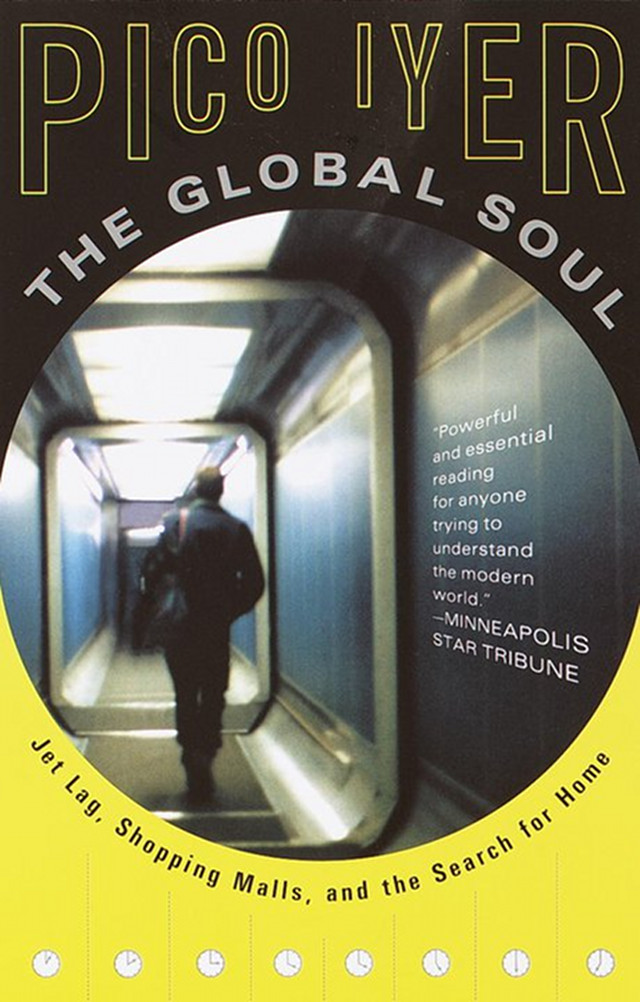SUMMARY
This is AI generated summarization, which may have errors. For context, always refer to the full article.

MANILA, Philippines – I’ve always felt very strange about my love for “the airplane moment” — that moment at take-off when you look out the window and only see lone and level tarmac. In a matter of minutes, you rise above and it transforms into a map encased with smog, nothing distinguishable but the SM signs and McDonald’s arches.
To me, travel has always felt like an escape, and there is nothing more escapist than seeing the harshness of this city fall away.
If you’ve ever felt this way about travel, that it gives you the privilege of pulling away from the present, then perhaps Pico Iyer’s books will speak to you. Iyer understands the complex feelings travel causes. In “The Global Soul,” his 2000 book on a rapidly expanding and increasingly interconnected world, he travels to hubs of globalization (e.g. LA’s international airport, the Atlanta Olympics, Hongkong as a global marketplace) and the feelings of pride, shame, disorientation, and awe that arise.
Iyer and the essay form
Above all else, Iyer is an excellent writer with an eye for detail and lyricism, balanced by an adherence to structure. His sentences, paragraphs and essays (around 40 pages each) are kilometric but never confusing. He is a master of the “transitionless transition” — that move from topic to topic, paragraph to paragraph which is unsignaled and yet perfectly logical.
He moves deftly between the tragic and the comic, the individual and the social with ease. And, he is nothing if not comprehensive in his explorations — he draws on the history, culture, geography, economics, and politics of each place he visits. His skill with the essay form ensures that readers can take in all the information he presents without feeling overwhelmed.
Which isn’t to say that he isn’t an exhausting writer. Sustained readings of his essays will show that he has some ridiculously overdone tricks. It sometimes seems that it doesn’t matter what the subject of the essay is — he will still go through the same gamut of emotions and experiences in each locale.
A commonly repeated motif in his essays is the “Oh, what a mixed up world we’re living in!” paragraph. Here’s an excerpt on the arrivals hall of LAX from his essay, “The Airport”:
A little Filipina girl came out of an air lock with Fred Flintstone in one arm and a panda in the other, and two lanky giants loped out in Aerial Assault sneakers, fresh from playing some exhibition games in Mexico. People shuffled up to one another, faces crumpled, so that it was clear that this was an antechamber of a funeral; other people clapped, bought eighteen-inch Mylar balloons, and wildly waved the flag of Mexico. An old Japanese man came in and said “Tadaima” — the ritual greeting used when one arrives back home (a grandson dutifully replied “Okaeri!”); a Thai girl filed out in thigh-high boots with a sandy-haired son whose name she couldn’t pronounce…
And so go these long, collage-like, proper noun-laden paragraphs. I get it: they’re there to call attention to the fact that we get people from different countries and different contexts in the same space all the time. Iyer is trying to mirror the dizzying nature of the 21st century, but he relies on the same feel of mismatch and chaos over and over again. There’s style, and then there’s being formulaic — he’s one of those writers who is best read infrequently, with long breaks in between.
Travel writing and privilege
Another pitfall that Iyer falls into is, for all his overthinking, he can’t get over himself and other privileged travelers like him. He’s a travel writer — he gets paid to go places and write about them, which affords him a level of contemplation and non-attachment from these locales. Unlike an OFW or a refugee, he travels with no investment in the journey, and with no goal at the destination except to be there.
He is reluctant to engage topics of globalization and global injustice, and the outlook of his essays is always infuriatingly optimistic about it. At some points in “The Global Soul,” he seems to begin exploring existing forms of injustice and marginalization (poverty, global hunger, sweat shops, cultural imperialism) and then it is quietly dismissed.
This privileged position and how it affects content is telling of Iyer, but also of the genre of travel writing itself — to be able to travel and contemplate your place in it requires little else to do but sit back and take it all in. It’s a favorite genre of mine, but the requirement of privilege can also make the essays in it seem vapid.
Reading memoirs of difficulty and suffering seem to contradict the expectations that we have when we approach a travel essay — we read in order to immerse ourselves in the details of the foreign, and too much “reality” might strain the boundaries of the genre.
And so, this summer, I encourage you to travel twice — to take journeys of your own, and to journey into the worlds that Pico Iyer builds. As you move from one place to another, let Pico Iyer be your articulate, introspective tour guide, and learn about yourself and the world around you. – Rappler.com
Florianne L. Jimenez teaches Literature and College Writing at the University of the Philippines Diliman. She is a Palanca award-winning non-fiction writer, with a creative interest in the self, places, and consciousness. She has a massive to-be-read pile dating back to 2008, which includes such titles as ‘The Collected Stories of Gabriel Garcia Marquez,’ ‘Book 5 of Y: The Last Man,’ and ‘The Collected Works of TS Spivet: A Novel.’
Add a comment
How does this make you feel?
There are no comments yet. Add your comment to start the conversation.